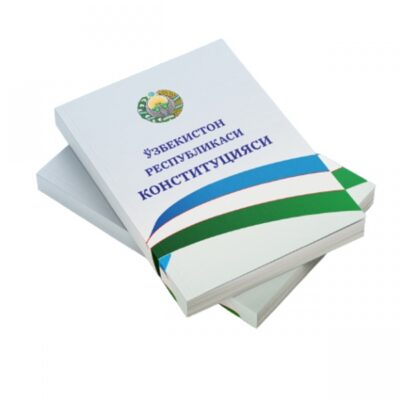What do you about the new constitution of the Republic of Uzbekistan?
Uzbekistan’s new constitution officially came into effect as of May 1, according to the Central Election Commission. The new constitution is composed of the preamble, six parts, 27 chapters and 155 articles. The changes were approved by an overwhelming majority of voters (90.2%) in a referendum held on April 30.
The constitutional law “On the Constitution of the Republic of Uzbekistan”, adopted by referendum on 30 April, came into force on 1 May, the Central Election Commission announced.
As of this day, if norms contained in other laws and legal acts contradict the constitution, the courts will rule on the basis of the constitution. The full text of the new constitution, which has 65% revised content compared to the previous version, can be found here. It comprises the preamble,six parts,27 chapters, and155 articles.
According to the law, the CEC (the Central Election Commission) must publish the decision on the referendum on its official website and in official sources no later than 10 days after the referendum has been held. The decision (law) adopted as a result of the referendum enters into force from the day of official publication of the referendum results by the CEC. On the day of the official publication of the referendum results, the decision is sent to the chambers of the Oliy Majlis and to the President for the organization of its implementation.
PREAMBLE
We, united people of Uzbekistan: solemnly declaring our adherence to human rights and freedoms, national and universal values, principles of state sovereignty, affirming our commitment to the ideals of democracy, freedom and equality, social justice and solidarity, aware of our ultimate responsibility to the present and the future generations for building a humane democratic state, an open and just society in which the person, human life, freedom, honor and dignity are the highest value, relying on more than three millennia-long historical experience in the development of our statehood, as well as the scientific, cultural and spiritual heritage of the great ancestors who made an invaluable contribution to world civilization, being determined to multiply and protect for present and future generations the invaluable natural wealth of the country and to preserve a healthy environment, based on the generally accepted norms of the international law, striving to strengthen and develop friendly relations of Uzbekistan with the world community, primarily, with neighboring states on the basis of cooperation, mutual support, peace and harmony, aiming to ensure a decent life for citizens, interethnic and interfaith harmony, well-being and prosperity of the multinational native Uzbekistan, hereby adopt and proclaim the present Constitution of the Republic of Uzbekistan.
PART ONE. FUNDAMENTAL PRINCIPLES
Chapter I. State Sovereignty.
Chapter II. Democracy.
Chapter III. Supremacy of the Constitution and the Law.
Chapter IV. Foreign Policy.
PART TWO. BASIC HUMAN AND CIVIL RIGHTS, FREEDOMS AND DUTIES
Chapter V. General Provisions.
Chapter VI. Citizenship.
Chapter IX. Economic, Social, Cultural and Environmental Rights.
Chapter X. Guarantees of Human and Civil Rights and Freedoms.
Chapter XI. Duties of citizens.
PART THREE. SOCIETY AND THE INDIVIDUAL
Chapter XII. Economic foundation of the society.
Chapter XIII. Institutions of civil society.
Chapter XIV. Family, children and youth.
Chapter XV. Mass media.
PART FOUR. ADMINISTRATIVE-TERRITORIAL AND STATE STRUCTURE
Chapter XVI. Administrative and territorial structure of the Republic of Uzbekistan.
Chapter XVII. Republic of Karakalpakstan.
PART FIVE. ORGANIZATION OF STATE AUTHORITY
Chapter XVIII. Oliy Majlis of the Republic of Uzbekistan.
Chapter XIX. The President of the Republic of Uzbekistan.
Chapter XX. Cabinet of Ministers.
Chapter XXI. Fundamental Principles of Local Bodies of State Authority. Self-government Bodies of Citizens.
Chapter XXII. Electoral System.
Chapter XXIII. Judicial Authority.
Chapter ХХIV. Legal profession.
Chapter XXVI. Financial, monetary and banking systems.
Chapter XXVII. Defense and security.
PART SIX. PROCEDURE FOR AMENDING THE CONSTITUTION
Some of the suggested changes in the referendum, among others are:
extending the presidential term from 5 to 7 years;
adding that Uzbekistan is a “legal, social, and secular” state (in addition to the current “sovereign” and “democratic”);
introducing language discouraging the state from harming the rights and freedoms of people and citizens (including in foreign policy);
adding rights/protections for the accused in crimes they have not yet been convicted of, as well asprohibiting extradition, capital punishment (constitutionally, as previously it was prohibited by presidential decree) and cruel and unusual punishment, and adding the defense of double jeopardy;
making all laws exempting or mitigating punishment for an offense retroactive;
guaranteeing the right to confidentiality of communications and the right to freedom of communication absent of a court order;
guaranteeing the right to protection of personal data; adding that “everyone has the right to get acquainted with the information collected about them in state bodies, self-government bodies of citizens, public associations, organizations and to correct incorrect information, as well as illegally has the right to request the destruction of data that has been collected or does not have a legal basis”;
adding labor protections such as fair remuneration and a living minimum wage, prohibiting wage discrimination or termination against women due to pregnancy or having children, and the right to paid parental leave;
adding that the state shall provide housing for the socially needy and low-income citizens who require improvement in housing conditions (subject to law), guaranteeing promotion of the rights of the disabled, and prohibiting discrimination against the disabled;
citizens are guaranteed (subject to law) a minimum amount of medical care free of charge at the point of service, including urgent and emergency care;
codifying a commitment to protecting the environment and sustainable development;
changing “Everyone has the right to education. Free general education is guaranteed by the state. School affairs are under state control” to “Everyone has the right to education. The state supports the development of preschool education and upbringing. The state guarantees the right of every child to undergo compulsory one-year training for admission to general secondary education institutions. Free general secondary education is guaranteed by the state. General secondary education is compulsory. School work, pre-school education and upbringing will be under state control. Inclusive education and upbringing are organized in educational organizations for children with special educational needs and individual capabilities. The state shall guarantee that talented young people continue their education regardless of their financial situation.
The state shall create equal conditions for the development of state-owned, private and other educational institutions and organizations. Strengthening the status of teaching staff in all aspects is the goal and responsible task of the society and the state. It is not allowed to interfere with the professional activities of teaching staff, as well as to prevent them from fulfilling their service obligations”;
adding that “Everyone has the right to get free higher education in public educational institutions on a competitive basis. Higher education and scientific-research organizations have the right to self-management, academic freedom, as well as freedom of research and teaching within the framework established by law. The state supports the development of science and the establishment of scientific relations with the world scientific community”;
adding that “Everyone has the right to protect their rights and freedoms in all ways not prohibited by law”;
adding that “Unfair competition and monopolization are not allowed in economic activity. The results of expropriation and privatization cannot be reviewed and canceled”;
introduction of compulsory acquisition in special cases (as stipulated by law), on the condition of advance and fair compensation to the owner;
adding that marriage “shall be based on the traditional family values of the people of Uzbekistan”;
adding that a person that is a member of the Oliy Majlis cannot be a member of the Supreme Council of Karakalpakstan at the same time;
extending the deadline for sending laws passed by the Oliy Majlis to the Senate (from the date of adoption of the law) from the current 10 days to 20 days; extending the deadline for sending the laws approved by the Senate to the president for signing and promulgation (from the date of approval of the law) from 10 days to 20 days; extending the time limit for the President to sign and promulgate the legislation passed by the Senate from the current 20 days to 2 months;
separating representative and executive power in regional government (previously both would be held by the regional Hokim);
clarifying that the Constitutional Court can “consider the complaints of citizens and legal entities regarding the verification of the constitutionality of the law applied to them by the court in a specific case”.
Senior teacher
Fakhriddin Ernazarov
of the “Languages“department
Used Internet websites
1.Legislationline.org
2.en.wikipedia.org
3.gazeta.uz






